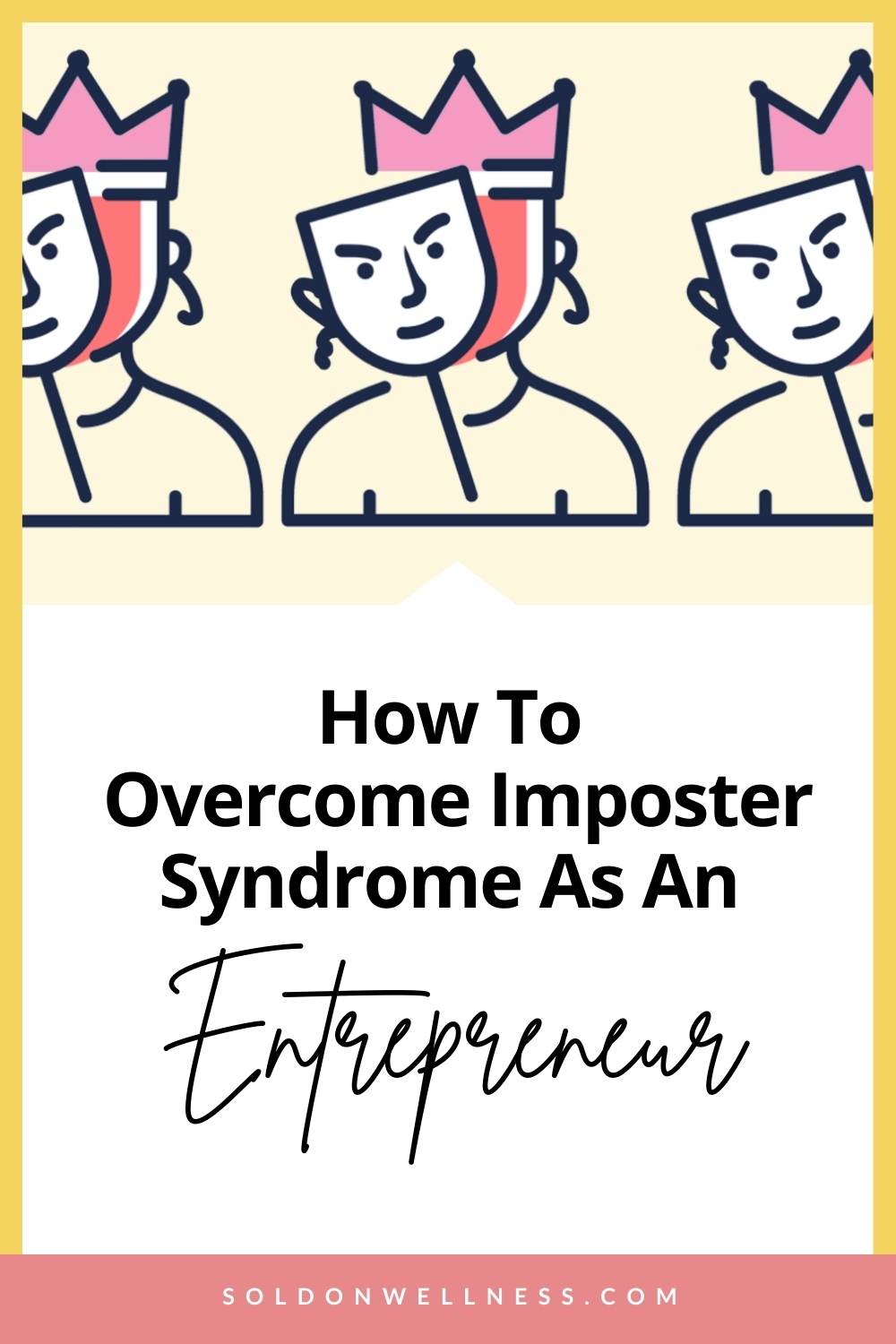How to overcome imposter syndrome, especially as a female entrepreneur, could be the one thing that helps you push past the symptoms of constant self-doubt and eventually do great things.
While imposter syndrome is common for people new to a field or trying something out for the first time, it can strike at any point in your career.
For example, as a female entrepreneur, you may feel like you don't deserve to be where you are, despite evidence suggesting that your hard work and experience has gotten you here.
As a result, this can cause problems when it comes to being confident in yourself or demanding things from others- especially if you have a leadership position within an organisation.
So while imposter syndrome is a common problem, it's important to know the signs and how to overcome them to take control of your career.
What is Imposter Syndrome?
Imposter syndrome is when you feel like a fraud or an impostor despite all evidence suggesting otherwise. This can include things such as believing that you're undeserving of the success that you've had or that you don't have what it takes to do the things you've already done.
This feeling of unworthiness can cause problems in many different areas of your life, including relationships, family and work. However, it's often associated with both students and professionals who are beginning their careers or new to a field.
Imposter syndrome can cause problems with self-confidence and drive, especially with women who tend to feel the negative effects more.
How to overcome imposter syndrome
So how can you overcome imposter syndrome? Here are some tips that can help boost your self-esteem and fight through the symptoms of constant self-doubt.
1. Remember that you're not alone
The first thing you should do is remember that this feeling of being an impostor isn't unique to you. In fact, about 70 per cent of people have experienced imposter syndrome at some point in their lives.
2. Be confident in your abilities
It may seem easier said than done, but trusting your own talents and skills is a good first step towards overcoming the constant self-doubt that comes from imposter syndrome. So the next time you feel like a fraud, take a step back and think about your strengths and abilities.
3. Don't be afraid to ask for help when you need it
Another part of imposter syndrome is feeling like you can do everything independently without asking for help from others. But to overcome the challenge, the best thing you can do is ask for help from a mentor, co-worker or even friend when you need it.
4. Take on a new challenge to prove that you're not a fraud
While taking on a new challenge might seem daunting, it's also a great way to show yourself that you have what it takes to get the job done successfully. So, for example, if you want a promotion at work or to get a higher salary, take on new leadership roles or other challenges that will prove your point.
Three main causes behind Impostor Syndrome
1) One of the main causes of Impostor Syndrome comes from always comparing yourself to other people. This can often lead you to believe that your success was due to luck or coincidence rather than an actual combination of hard work and talent. This is not uncommon- many people are unaware of their own abilities and talents because they don't even realise it.
2) Another major cause of impostor syndrome is underestimating your own ability. This can be brought on by various factors such as anxiety, fear of failure and low self-esteem. It can also come from perfectionism, which often manifests unhelpful: instead of trying to avoid mistakes, you downplay your success.
3) The third major cause of impostor syndrome is not aware that you are an achiever in the first place. This is especially common for people who have grown up underprivileged or with a history of failure. As a result, even if they accomplish something great, they assume it is just luck and doesn't consider themselves high-achievers.
Let's talk about the different types of impostor syndrome
There are different types of Impostor Syndrome, based on who is experiencing this self-doubt.
Types Of Imposter Syndrome
1. The Superwoman/man
his type of imposter syndrome is also known as the 'impostor cycle'- a feedback loop that involves constantly seeking success to escape feelings of being a fraud. But no matter how much you achieve, it's never enough, and you're always convinced that it's just a matter of time before you're exposed as a failure.
Way Out Tip
Try to be aware of your own abilities and trust yourself more.
2. The Natural Genius
This imposter syndrome comes from the assumption that success in anything is something you either have or don't have. As a result, any success in your life is attributed to luck rather than hard work and preparation.
Way Out Tip
This type of imposter syndrome can be challenging because it often goes hand-in-hand with perfectionism. Try not to set impossible standards for yourself and start taking more risks.
3. The Hustler
This type of imposter syndrome comes from a deep-rooted belief that they only got the opportunity because someone else let them in, despite having no experience or qualification. This is common for young people trying to break into an industry no matter what it takes.
Way Out Tip
Try to focus less on getting your foot in the door or having an 'in' and focus more on developing your actual expertise.
4. The Rookie
This type of imposter syndrome is related to inexperience and lack of confidence in new experiences. It can be challenging for 'newbies' to feel like they belong in an industry when everyone else seems much more experienced than them, even though there is no reason for this.
Way Out Tip
Relax and remind yourself that everyone has to start somewhere. Also, take advantage of resources such as mentors, study groups, or even having people around you who are willing to discuss the position.
5. The Expert
This type of imposter syndrome is when people underestimate their own expertise, which can be brought on by a lack of confidence in their knowledge and abilities. This is common for experts who have been in their industry without interruption for a long time. They may struggle to see that what they know may be outdated, despite constantly being reminded of this by onlookers.
Way Out Tip
Remind yourself that you are constantly learning new things and consider asking for feedback to help you improve your skills if needs be.
Deeper Dive:
7 key Inspirations For When You Feel Lost In Life
How to Deal With Toxic People for Good in 7 Ways
7 SIGNS YOU ARE BEING MANIPULATED
How to Maximise Your Happiness
6. The Workaholic
This imposter syndrome comes from a need always to appear busy, even when there is less work to do. Workaholics often find themselves in situations where they are required to complete the same tasks repeatedly, which can be hard when you feel like your efforts aren't making a difference.
Way Out Tip
Try not to take on too much work at once and break down larger projects into smaller, more manageable tasks.
7. The Carer
This type of imposter syndrome is closely related to workaholism, but this is when you have trouble doing anything outside of work because you feel like you need to take care of others' needs before your own. You may even feel pressured into helping out to the detriment of your own health or relationships.
Way Out Tip
Start saying 'no' to things you don't have time for. Also, make sure that you take time out of your day to do something nice for yourself or hang out with friends- even if it's only once now and again.
8. The Soloist
This type of imposter syndrome comes from a strong belief that you need to appear and be perfect all of the time. Lone wolves often struggle with managing their own careers despite being surrounded by people who could help them succeed.
Way Out Tip
Try learning how to delegate and look for ways to collaborate on projects rather than going at everything alone. Also, remember that you are not expected to have all of the answers.
9. The Perfectionist
This type of imposter syndrome can be brought on by a desire for everything to be perfect, even though nothing is ever 100% guaranteed. You may find yourself unable to finish projects or meet deadlines because you are trying too hard to ensure that everything is perfect.
Way Out Tip
Try to focus on the process rather than the outcome by breaking down larger projects into smaller, more manageable tasks. Also, remember that you are not expected to have all of the answers.
10. The Super-Intelligent 'Alien.'
This type of imposter syndrome is common among highly intelligent people, who always feel that their success is due to chance or luck instead of their own abilities. This leads them to believe that they don't deserve the success they have achieved and are constantly waiting for someone to expose them to fraud.
Way Out Tip
Don't be so hard on yourself, and remember that you have accomplished a lot in your life so far, even if it feels like luck.
11. The Expert Beginner
This type of imposter syndrome is seen quite often in people who are new to an industry or new to a job. Even if they have a vast knowledge of a subject, this type will avoid situations where they can be seen as an expert, leading them up the career ladder.
Way Out Tip
Don't allow your fear of failure to hold you back from accepting opportunities- no one starts as an expert, so don't beat yourself up if you don't know everything from the start.

Final Thought on how to overcome imposter syndrome
If you're feeling like an imposter, it's time to stop being hard on yourself. Impostor syndrome is a common problem that many people face at different points in their lives and careers. The more confident you are about your skills, the less likely it will be for this type of mental roadblock to hold you back from achieving success.
If you liked this article, you might also like these articles.
Have any comments or questions? Share your thoughts below!
More Resources
Prevalence, Predictors, and Treatment of Impostor Syndrome
Imposter Syndrome Defined: 5 Fascinating Research Findings





